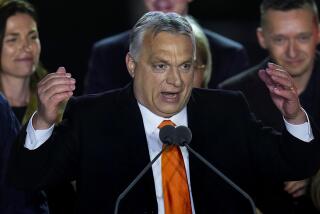MIDDLE EAST : Iraqi Dissidents Meet to Plot Against Hussein : The loose alliance has been gaining strength. Some diplomats suspect the goal is an independent Kurdish state.
- Share via
SALAHUDDIN, Iraq — The biggest gathering yet of Iraqi dissidents is under way in northern Iraq, but the men who would depose President Saddam Hussein, ever wary of his long reach, are keeping the location secret.
About 200 dissident leaders are about to begin a three-day meeting somewhere in the allied-protected mountains of Kurdistan to plot Hussein’s downfall and plan a democratic, pluralistic and free-market structure to replace 24 years of dictatorial rule.
Safin Dizayee, representative in Turkey of the big Iraqi Kurdistan Democratic Party, said a major goal of the conference is “to introduce the opposition to the Iraqi people.”
Among those attending will be men who served the Iraqi government as generals, ambassadors and Cabinet ministers. The conference is expected to select a transitional parliament drawn from across Iraq’s ethnic and political spectrum. For its leadership, there will be an executive of at least a dozen members, topped by a collective presidency of up to seven people.
Dominated by the Kurdish rebels, the loose coalition includes Communists, Arab nationalists, ethnic Turkomans and Islamic fundamentalists. The alliance has been gathering momentum since a ground-breaking congress in Vienna last June. This meeting--attended by as many as two dozen opposition groups, some of them quite small--is described as the largest such gathering since the 1960s and the first on Iraqi soil since Hussein seized power in 1968.
Since the Vienna meeting, the opposition leaders have met U.S. Secretary of State James A. Baker III and Turkish President Turgut Ozal, and they clearly have the West’s backing.
“We are obviously supportive of steps by the people of Iraq to get rid of a dictator, provided there is no prejudice to the country’s territorial integrity,” said one Western diplomat.
The note of warning is clearly aimed at the Kurds. There is suspicion, especially in Turkey, that the Kurds have a secret agenda for an independent Kurdish state, an option repeatedly ruled out by Turkish and Western chancelleries alike.
The concerns have arisen since Iraqi Kurdistan staged parliamentary elections in May, then installed a Kurdish government in northern Iraq complete with a prime minister, missions abroad and the makings of a standing army. This Kurdish Parliament then unilaterally announced on Oct. 4 that northern Iraq had become a “federal” Kurdish state, a decision denounced by Turkey as a step toward Kurdish independence and Iraq’s disintegration.
“There can’t be a state for every language,” said Turkish Prime Minister Suleyman Demirel.
As an illustration of the regional rivalries that have always plagued the Iraqi opposition, attendance at the conference will not be total; some of the dissidents based in Syria are not expected to attend.
Turkey is, however, the foreign power most directly involved in northern Iraq. For much of the past week, Ankara government troops have been hammering positions in the remote mountains of both southeastern Turkey and northern Iraq to root out the Kurdistan Workers Party, or PKK, a Kurdish rebel group seeking self-rule for the 12 million Kurds of Turkey.
The attacks on several thousand PKK guerrillas follow a 2-week-old offensive against the PKK by the Iraqi Kurds themselves. No one is sure how many people have been killed, but the offensive seems sure to have weakened the once-powerful PKK.
The Iraqi Kurds were acting to establish their authority, reduce the influence of the Marxist PKK and also ensure the goodwill of Turkey, which controls the Iraqi Kurds’ main supply and communication lines.
The Iraqi Kurds are suffering from a triple blockade: the international sanctions on Iraq since the invasion of Kuwait, a year-old blockade against Kurdistan by the Baghdad regime and now a dramatic drop in cross-border traffic because of threats from the PKK against Kurdish truckers from Turkey.
“At least half the population will require some level of emergency food assistance,” and most will require fuel this winter, Catherine Farnsworth of the Office of U.S. Foreign Disaster Assistance told reporters after an eight-day international survey. “Northern Iraq is facing a humanitarian emergency of immense proportions.”
Gathering in the Mountains
Dominated by Kurdish rebels, a conference of Iraqi dissidents opposed to Saddam Hussein is gathering at a secret location in the mountains of Iraqi Kurdistan, part of the larger Kurdistan that embraces four countries.
More to Read
Sign up for Essential California
The most important California stories and recommendations in your inbox every morning.
You may occasionally receive promotional content from the Los Angeles Times.












